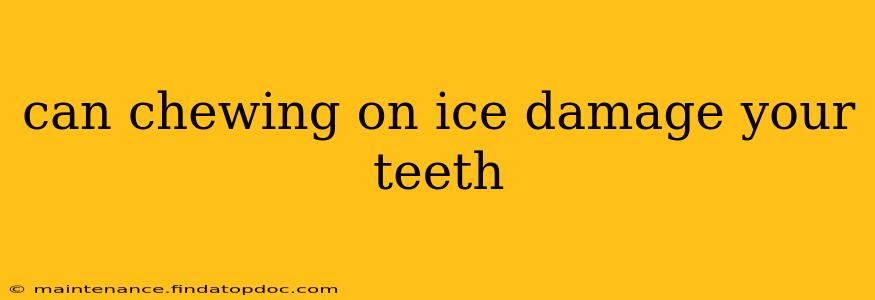Chewing on ice may seem harmless, a refreshing way to cool down on a hot day. However, the reality is that this seemingly innocent habit can inflict significant damage on your teeth. This article delves into the potential harm of ice chewing, explores the reasons behind the damage, and offers advice on breaking this potentially damaging habit.
Why is Chewing Ice Bad for Your Teeth?
The primary reason chewing ice is detrimental to your dental health is its hardness. Ice is significantly harder than your tooth enamel, the protective outer layer. Repeatedly crunching on ice chips creates microfractures in this enamel, weakening it over time. These tiny cracks are often invisible to the naked eye but progressively increase your susceptibility to cavities, sensitivity, and even tooth breakage.
What Kind of Damage Can Ice Chewing Cause?
The damage caused by ice chewing isn't always immediately apparent. It's a slow, cumulative process that can lead to a variety of dental problems:
- Cracked or Chipped Teeth: The most obvious consequence is physical damage. The force exerted on your teeth while chewing ice can easily chip or crack them, requiring costly dental repairs.
- Enamel Erosion: The constant abrasion from ice chips gradually wears away the protective enamel, leaving your teeth vulnerable to decay and sensitivity.
- Tooth Sensitivity: Once the enamel is compromised, the dentin (the layer beneath the enamel) becomes exposed. This layer contains microscopic tubules that lead to the nerve of the tooth, resulting in increased sensitivity to hot and cold temperatures, sweet foods, and even air.
- Increased Risk of Cavities: Weakened enamel makes your teeth more susceptible to bacterial attack, leading to an increased risk of cavities and decay.
How Can I Stop Chewing Ice?
Breaking a habit like ice chewing requires conscious effort and potential substitutions. Here are some strategies:
- Identify Triggers: Understanding why you chew ice is crucial. Is it boredom, a need for a cold sensation, or a nervous habit? Addressing the underlying cause will significantly improve your chances of success.
- Find Healthy Alternatives: Replace the ice-chewing habit with healthier options like chewing sugar-free gum, drinking plenty of water, or eating crunchy fruits and vegetables. These provide the satisfying oral stimulation without the damaging effects.
- Mindfulness and Awareness: Pay close attention to when you reach for ice. This increased awareness will help you catch yourself in the act and choose a healthier alternative.
- Seek Professional Help: If you struggle to quit chewing ice on your own, consider seeking guidance from a therapist or counselor who can help you identify and address the underlying causes of the habit.
Can Chewing Ice Cause Other Dental Problems?
While the direct damage to teeth is the most significant concern, chewing ice can indirectly contribute to other dental problems. The cracks and weakened enamel created by ice chewing can exacerbate existing issues, such as existing fillings or crowns. It’s important to have regular dental check-ups to monitor the health of your teeth, especially if you have a history of ice chewing.
Is it Okay to Chew Ice Occasionally?
While the occasional nibble on an ice cube is unlikely to cause significant damage, habitual ice chewing is extremely detrimental. The key is moderation. If you find yourself routinely crunching on ice, it’s time to reconsider this habit.
How Can I Repair Ice-Chewing Damage?
Repairing damage caused by ice chewing depends on the severity of the issue. Minor enamel erosion may not require treatment, but chipped or cracked teeth will need professional dental intervention. Your dentist can assess the damage and recommend the appropriate course of action, which may include fillings, crowns, or bonding.
In conclusion, while chewing on ice might provide temporary refreshment, the long-term consequences for your teeth far outweigh any short-lived benefits. By understanding the potential damage and implementing strategies to break the habit, you can protect your smile and maintain optimal oral health. Remember to consult your dentist for regular checkups and professional advice.
